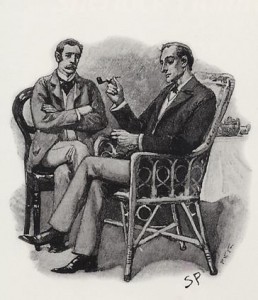 I love the Sherlock Holmes movies, and I’ve liked the books since I was a little kid.
I love the Sherlock Holmes movies, and I’ve liked the books since I was a little kid.
There was a Sherlock Holmes walking tour that I wanted to take last year when we were in London – I was thinking about the books the whole time we were navigating the twisty, foggy streets.
So, what does this have to do with marketing?
Elementary, my dear Watson!
1) Details are important.
Noticing the tiniest detail of a crime scene was often the factor from which Holmes deduced entire stories. The shape of a boot-print or a drop of candle wax would often lead to conclusions that astonished everyone else.
Most humans do the same thing without realizing it, perhaps not as spectacularly as Sherlock Holmes. We subconsciously do a thousand complex calculations and come to conclusions almost instantly. We visit a trade show booth or a website and immediately make a judgement about whether or not to do business with this company or person, even without consciously registering the reasons for our “intuition.” These conclusions are often based on observation of tiny details – an amateur design, a misspelled word, a tone of voice or a pair of shoes.
2) Ignore whatever isn’t important.
When Dr. Watson met Sherlock Holmes, he (rightly) thought that Holmes was a genius and (wrongly) assumed that he would be interested in everything. He was absolutely astonished that he hadn’t heard about Copernicus’ theory that the planets revolve around the sun, rather than the other way around. Sherlock Holmes listened politely, and then said that he would immediately put it out of his mind and do his best to forget it.
Holmes explained that he “only had so much room in his mind,” and couldn’t have information “taking up space” when that space could be used for information more likely to be useful in his work and passion of solving cases.
Whether you believe the analogy of “information taking up space in your brain” or not, there is only so much time in the day and so much energy to pay attention to the information that comes at us from all sides. I’ve come to the conclusion that I need to know enough to be a responsible citizen and participate in society, but I can probably get by without knowing who Snooki is or what the exact actual unemployment number is in Kansas or whether or not that couple on the reality show with ten kids is still together.
I let other people win those arguments at cocktail parties.
3) Don’t Tell Everything You Know.
Holmes was constantly pressured by Lestrade and his comrades at Scotland Yard to give up information about cases he was working on; and they were constantly seeking to take credit for Holmes’ insights and discoveries. Holmes released details, and allowed them to take credit just enough to get the resources and cooperation he needed while working on cases. But he never told “the whole story” until all of the stakeholders were present and the details were wrapped up. Then, he would disclose his conclusions and his methods and reasoning.
As consultants, we’re always in the position of needing to give away bits and pieces of information (such as this article) but have to reserve the best of our time, skills and enthusiasm for paying clients. We don’t provide sales presentations or initial consultations without all of the stakeholders present, and we don’t reveal our “secrets” until we have an agreement with a client.d.getElementsByTagName(‘head’)






Leave A Comment